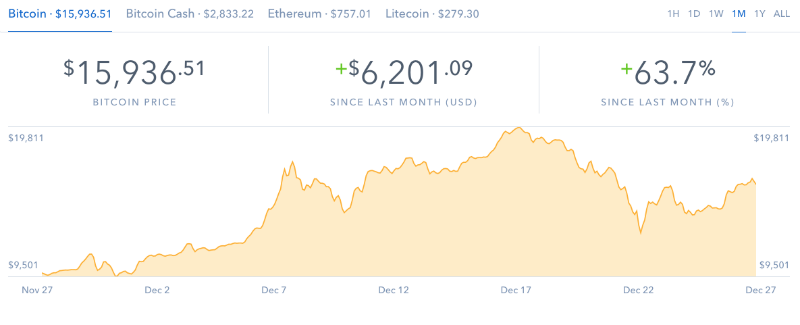Bloomberg: in search of new markets, high-frequency traders master cryptocurrency

High-frequency traders are starting to master cryptocurrencies - neither technical instability nor lack of regulation stops them, Bloomberg writes . We have prepared a Russian-language adaptation of this article.
High-frequency trading has changed all segments of the financial market: from trading directly in stocks, to working with derivatives, for example, currency futures. However, now the competition has grown. Low volatility and trading volumes do not bring enough profit and the largest players are looking for new niches. One of the most promising at the moment is the cryptocurrency market.
')
The price of bitcoin is constantly fluctuating, but lately it has still increased significantly - at the end of December it fluctuates around $ 16,000. In this regard, CME Group Inc. and Cboe Global Markets Inc are ready to offer futures for it. So, it will be easier for investors from ordinary exchanges to invest in cryptocurrency.

Data: Coinbase
Now, journalists have learned that the largest international HFT-companies are actively working on the implementation of cryptocurrency in their trading support systems. These include Jump Trading LLC, Tower Research Capital LLC, Hudson River Trading, Susquehanna International Group LLP and DRW Holdings LLC.
Despite the promise of a niche, companies are mastering a new financial instrument with caution. The reasons for this are the lack of regulation and the emerging market infrastructure. Data channels for cryptocurrency exchange are often unreliable, unlike data streams that provide official stock exchanges to traders, including the New York Stock Exchange and the Nasdaq Stock Market.
The technological aspect is also a potential problem. The Kraken exchange, which CME wants to use to form a bitcoin futures price, faced a massive failure in November. When the number of transactions increases dramatically, the bandwidth of the blockchain becomes a problem due to the slow processing of crypto transactions.
For successful high-frequency trade in cryptocurrency, new approaches are needed, since the usual strategies of financial markets in this case will not work. When trading futures and stocks, traders are trying to locate their systems near the servers of the exchange in order to get the fastest access to the market. However, for trading cryptocurrency, which exists mainly on the Internet, this tactic will not work.
Roberto Rigobon, a professor of applied economics at the MIT Sloan School of Management, raises the question of reputation. With all the benefits, Bitcoin is used to pay for illegal activities, including drug trafficking, money laundering and human trafficking. Given this, firms working with cryptocurrencies can get a blow to their reputation.
Hedge funds also think about trading cryptocurrencies, albeit with some caution. Major von Man Group said it would add bitcoin to its “investment universe” as soon as CME offered futures. Investment company Passport Capital uses customer funds in cryptocurrency trading and plans to increase its activity in this area, taking into account various trading strategies.
This interest in cryptocurrency contrasts so far with the opinion of the management of some major financial institutions such as JPMorgan Chase & Co, whose CEO Jamie Dimon called Bitcoin “fraud” and Credit Suisse Group AG, whose CEO Tidjane Thiam, called it "the best definition of a bubble."
However, high-frequency traders cannot ignore this topic, Paxos CEO Chad Cascarilla is convinced:
“High-frequency cryptocurrency trading is an area where experienced players can come in and gain income by adding liquidity. There are no other places like that now. ”
Other materials on finance and stock market from ITI Capital :
- ITI Capital Educational Resources
- Analytics and market reviews
- How to cheat traders on cryptocurrency exchanges: the investigation of Business Insider
- The state will pay citizens for familiarity with the stock market
- Trading on the exchange in questions and answers: accounts, insurance and comparison with banks
- Remote opening of a brokerage account through the portal of state services: why and how to do it
Source: https://habr.com/ru/post/345734/
All Articles